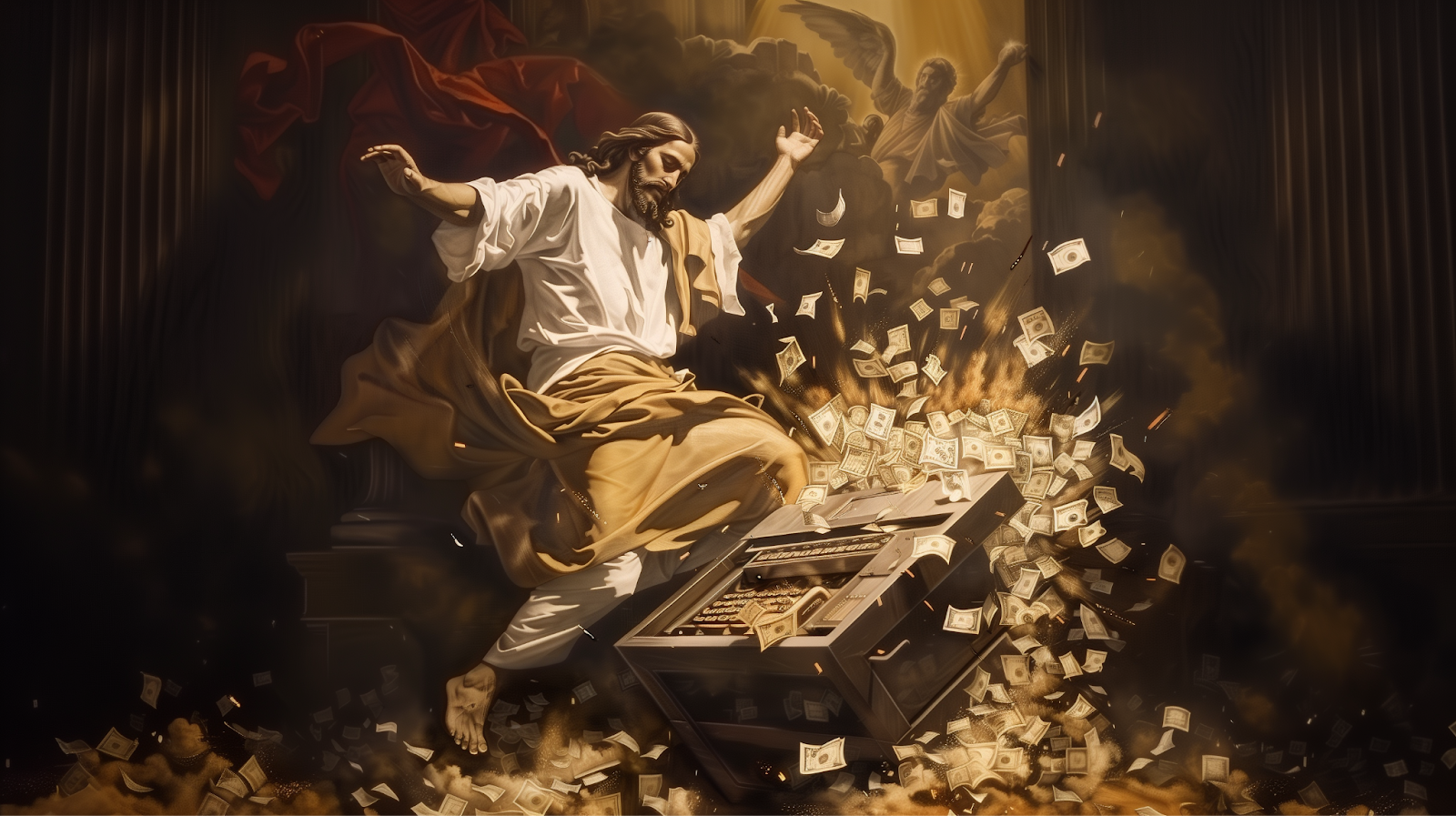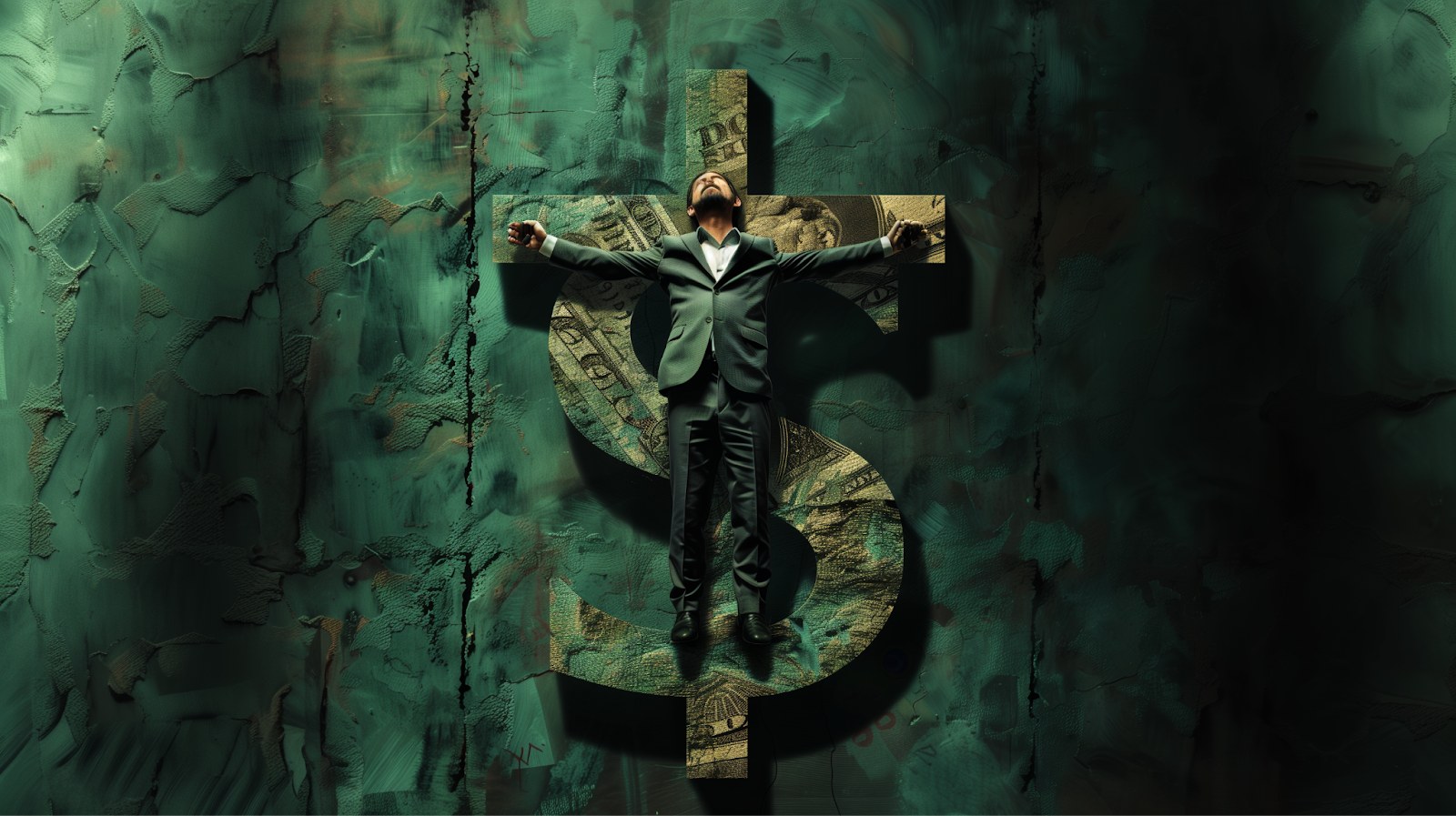Immoral Fiat Money
@FractalBounce: April 17, 2024

Why should we build our house on the rock instead of sand? Sand is unstable, shifting, unfit for a solid foundation. But what if the entire world order was built on shifting sand? What would that look like? It would be a scene of unraveling, a spectacle of extremes where traditions and cherished ideals crumble before our eyes. We would witness the dismantling of societal structures, degeneration, debauchery, perversion, or outright destruction. In such a scenario, stability becomes a fleeting notion, and the fabric of civilization disintegrates amidst the tumult of uncertainty.
FIAT MONEY
On what foundation is our world built? What is a crucial layer of society? What is the one thing we all need in order to survive? It is something we live for and most of our time is spent trying to obtain it. Some even die for it. In modern civilization, the concept of money stands as an immutable cornerstone, a foundational bedrock upon which the structure of society is built. It is the catalyst for transactions, the lubricant of trade, and the lifeblood of economies worldwide. As individuals, we dedicate significant portions of our lives in pursuit of monetary resources, recognizing its indispensable role in securing our needs and aspirations. Indeed, the universal importance of money underscores its status as a fundamental pillar of human interaction and progress, permeating every facet of modern civilization with its pervasive influence.
Our current economic system is not what it seems. Today’s money exists without tangible assets to back it; it is merely decreed into existence through the creation of debt. Every dollar is born from a loan, with no inherent value aside from the faith placed in it by society. The global debt, exceeding $300 trillion, is an inconceivable burden weighing upon humanity. Money is sustained only by the collective faith in the state, masking the inherent deceit and theft at its core. Despite moral objections, individuals are compelled to participate in this system, forced to hold fiat currency, complicit in its theft-based foundation simply to survive. Beyond inflationary theft, the system’s architects weaponize money, using it to manipulate societal perceptions through psychological operations, funded by freshly printed currency. Thus, the Fiat Matrix emerges—a cage of control, where humanity is stored and its energy siphoned away, all under the guise of monetary exchange.

The fiat monetary system, just over 50 years old, may one day be viewed as a dark era, characterized by deception and manipulation. Humanity is ensnared within a system of money built upon lies, where spiritual identity is obscured, and power is concentrated in the hands of a few. This period in history, marked by the reign of fiat currency, sees the theft of human energy by those serving dark spiritual forces. In this cage of deceit, Christians and people of faith must remain vigilant, for the system’s very foundation is rooted in evil. Money printing, disguised as a means of economic stability, is revealed as a covert form of theft, eroding the purchasing power of individuals over time, leaving them with a dwindling value of their stored efforts and energy.
As one delves into the depths of the monetary system, its immorality becomes increasingly apparent. Bitcoin’s arrival in 2009 marked a declaration of war against this immoral and deceptive system. It presents an opportunity to confront the grip of corruption and pave the way for a more just and moral future, free from the shackles imposed by governments under the sway of dark forces.
BITCOIN
Bitcoin, often called digital gold, transcends the confines of physicality and centralization, embodying the essence of property in its purest form. Its decentralized nature, governed by cryptographic algorithms rather than human intermediaries, makes it resilient, akin to the foundations upon which ancient structures were built. In the ethos of Bitcoin, ownership is not tethered to physical boundaries or bureaucratic mandates but rather to cryptographic keys, rendering it impervious to the whims of governmental oversight or institutional manipulation.

In the ethereal realm of code, Bitcoin finds its essence mirrored in the laws governing its existence. Far removed from the capricious nature of human legislation, the protocol underlying Bitcoin operates with a mathematical precision that transcends cultural biases and political agendas. In this realm, the rules are set, the code immutable, and the consequences of transgression, unforgiving. Thus, Bitcoin becomes not merely a currency but a testament to the power of code as law, forging a new paradigm where trust is vested not in fallible institutions but in the incorruptible logic of mathematics.
In a landscape fraught with uncertainty and instability, the allure of Bitcoin lies not only in its potential for financial gain but in its capacity to provide a sanctuary amidst the shifting sands of traditional finance. As the world grapples with the implications of an increasingly digitized economy, Bitcoin stands as a flag of hope, offering a glimpse into a future where the immutable laws of mathematics reign supreme, and the foundations of society are built upon the bedrock of innovation and decentralization.
A DECEPTIVE SYSTEM
The workings of our current monetary system unveil a stark truth: It is fundamentally immoral. Christians, therefore, should take keen interest in Bitcoin’s emergence as a technological tool offering an unstoppable decentralized solution to dismantle this immoral tyranny. However, the church appears oblivious to the moral and spiritual implications of the monetary system, failing to recognize Bitcoin as a potential force for redemption aligning with Biblical ideals. Christian leaders’ ignorance or dismissal of Bitcoin’s significance reveals a deeper issue within modern Christianity, where signs, symbols, and hidden meanings have been stripped away, leaving behind mere psychological or cultural ideology, vulnerable to manipulation and deception.
This manipulation and deception extends to the miseducation surrounding the monetary system, where the endless printing of money is the only solution to every problem. Bitcoin transcends mere digital asset status; it embodies an ideology rooted in the natural order, serving as a symbol of light illuminating the path out of tyranny. Yet, if spiritual leaders fail to remind their congregations of the spiritual battle against the forces of evil, acting through government puppets, they risk perpetuating ignorance and unwitting worship of the fiat idol. Ultimately, the sheep remain unaware, guided only by what they have been taught, ignorant of the broader spiritual and moral implications at play.

In a world where logical questioning has been replaced by blind acceptance, Bitcoin is a beacon of skepticism and inquiry. It challenges the very foundations of the financial system, daring to question the mechanisms that sustain it. As society witnesses the breakdown of institutions and the erosion of trust in established systems, Bitcoin serves as a catalyst for critical examination. It exposes the deception and theft ingrained within the current monetary paradigm, refusing conformance to the dictates of those in power. By questioning the status quo and shedding light on the culprits behind societal decay, Bitcoin emboldens individuals to challenge authority and reclaim sovereignty over their financial destinies.
In the backdrop of a failing system and a culture of passive acceptance, Bitcoin stands as a disruptive force, confronting the powers that be. It refuses to bow to the Kings of the Earth, rejecting the Satanic authority imposed upon it by centralized institutions. Instead, Bitcoin offers an alternative narrative, one rooted in transparency, decentralization, and individual empowerment. By exposing the flaws inherent in the existing financial infrastructure, Bitcoin sparks a renaissance of analysis, encouraging individuals to question, challenge, and ultimately redefine the very essence of finance and governance.
Bitcoin represents more than just a form of currency; it embodies philosophical ideas at the intersection of technology, economics, and philosophy. It transcends traditional notions of money, serving as a manifestation of effort—a culmination of human labor transformed into a preserved value, woven into the digital landscape. Bitcoin’s essence lies in its multifaceted nature: It is property, governed by the principles of ownership; it is code, embodying the immutable laws of mathematics; and it is energy, harnessed through the mining process. Through these facets, Bitcoin is not only a revolutionary financial instrument, but also a profound philosophical concept, reshaping our understanding of value, ownership, and sovereignty.
BITCOIN IS PROPERTY
Bitcoin is property. The introduction of scarcity fundamentally alters our understanding of digital space. Prior to Bitcoin, the digital realm was a boundless and infinitely replicable expanse. Bitcoin’s emergence changed this, as the creation of new Bitcoin requires the expenditure of real-world resources in the form of computational power, which requires electricity. Bitcoin’s introduction of scarcity imposes constraints on the digital realm, imbuing it with a sense of scarcity akin to physical assets. Essentially, Bitcoin introduced a space-time continuum into cyberspace. This scarcity is not imposed by any central authority, but it grows organically from the decentralized network consensus mechanism. As a result, ownership of Bitcoin becomes a testament to one’s investment of real-world resources, reinforcing value and creating a digital economy grounded in scarcity.
BITCOIN IS LAW

Bitcoin is code and code is Law. In traditional societies, laws serve as the foundational framework upon which communities are built and governed. These laws dictate behavior, establish rights and responsibilities, and provide the structure necessary for cohesive social organization. Yet, behind these laws often stand rulers—individuals or institutions vested with authority to enforce and interpret them.
Bitcoin disrupts this paradigm by embodying rules without rulers. Its code serves as the ultimate arbiter of behavior within the Bitcoin network, dictating the rules of engagement and the parameters within which transactions occur. This decentralization of authority challenges traditional notions of governance, where power is concentrated in the hands of a select few.
In the realm of Bitcoin, there are no rulers to dictate nor to enforce the rules. Instead, the network operates according to consensus mechanisms encoded within its protocol. Transactions are validated through an elegant system of a distributed network of nodes, each adhering to the same set of rules, without the need for centralized oversight or intervention.
BITCOIN IS ENERGY

Bitcoin is energy. Through its Proof of Work protocol, Bitcoin captures energy from the universe and encapsulates it within its digital framework. In this process, the laborious computations undertaken by miners serve as a conduit for the conversion of human effort into a form of stored energy—a digital embodiment of the work expended.
In essence, Bitcoin acts as a conduit, converting the ephemeral energy of human labor into a tangible form of value, preserved and perpetuated through the mechanism of scarcity. This preservation of value is not arbitrary, but it is inherent in the very fabric of Bitcoin’s design, where scarcity is meticulously enforced through the algorithmic constraints of its protocol.
Moreover, Bitcoin’s preservation of value through scarcity invites philosophical reflection on the nature of value itself. In traditional economic systems, value is often subject to fluctuations influenced by a myriad of factors, including human perception and market dynamics. However, Bitcoin’s scarcity serves as a bulwark against such fluctuations, anchoring its value to the immutable laws of mathematics and the finite resources of the universe.
Furthermore, Bitcoin’s embodiment of energy extends beyond its role as a medium of exchange to encompass broader existential inquiries. It prompts us to contemplate the interplay between human agency and cosmic forces, as well as the inherent value embedded within the fabric of existence itself. However, beneath the veneer of digital abstraction lies a tangible truth: Bitcoin is energy incarnate. The mining process, integral to its operation, harnesses the latent potential of electricity to secure the network and validate transactions. This symbiotic relationship between energy and value underscores the intrinsic worth of Bitcoin, imbuing it with a substance far beyond its digital form. In a world increasingly defined by environmental concerns and finite resources, the energy-intensive nature of Bitcoin mining stands as a testament to the value humanity places upon its pursuit of innovation and progress.
In conclusion, the narrative surrounding the fiat monetary system and Bitcoin draws stark contrasts between instability and stability, deception and transparency, manipulation and empowerment. The current monetary paradigm, underpinned by fiat currency, is inherently flawed and deceitful, constructed on a foundation as unstable as sand. It thrives on the exploitation and manipulation of human effort and faith, subjugating society to the whims of those in power through deceptive economic practices.
Against this backdrop, Bitcoin emerges not merely as an alternative form of currency but as a revolutionary ideology that challenges the core of this corrupted system. It advocates for a return to a more stable foundation, akin to building a house on solid rock. Bitcoin, with its decentralized nature, immutable code, and reliance on the fundamental laws of mathematics, offers a beacon of hope. It embodies the principles of true ownership, transparency, and independence from the manipulative tactics of centralized authorities.
The adoption of Bitcoin could potentially herald a new era of financial sovereignty and integrity. It prompts a reevaluation of what constitutes true value and stability in an economy. By embracing Bitcoin, society may move towards a more equitable and just system where value is defined by scarcity and secured by the immutable laws of the digital realm, not by the arbitrary decisions of policymakers or the printing presses of central banks.
As we stand at this crossroads, the choice between continuing on a path of financial instability and moving towards a more secure and honest system becomes clear. Bitcoin offers not just a technical solution but a philosophical rebirth of the concepts of money and power. Whether this potential is realized will depend largely on the willingness of individuals and communities to rethink the foundations upon which their economic systems are built. As such, Bitcoin does not just represent a new form of money; it advocates for a reimagined future where financial systems serve the populace equitably and transparently, standing firm like a house built on solid rock.